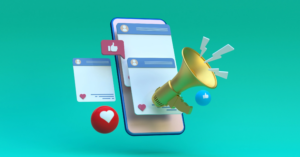Brad Post, Create the Movement, host
Joseph Bojang, Web Champs
Brad Post, Create the Movement, host: Welcome back to this edition of our podcast. I’m excited to be sitting with a good friend of mine, Joseph Bojang. How are you, Joseph?
Joseph Bojang: I’m good. Thank you for having me, Brad.
Web Champs
BP: But just been a good friend for a long time. We met at another company that we worked at. And Joseph has got some really neat things that he’s been doing with email marketing – webchamps.net.
BP: So, I wanted bring Joseph in and kind of have him share a little bit about email marketing. But first, just before we get into that, just if you could, kind of share your story. You can condense it, short version, long version. You know? Just however you feel led to share.
JB: Yeah. So, I would say it started probably in 2011. I had several years of actually working in nonprofit where I was helping people in many different ways. And learning how to do all type of resourcing, asset mapping for communities, while at the same time doing freelance web design work. And for a short period doing some remote work for design agencies.
But in 2011 I actually decided to give this whole entrepreneurial thing a go. And in doing that quickly found one client which was how I met you on my first day of doing some work for that client. It turned into something to where it’s like, “Hey, why don’t you come in and do more work for us?” And in that process I actually started getting more, this is around 2012, I started getting more into marketing. And a lot of that experience that I had from working in the non-profit really transitioned well into working in a marketing environment where a lot of the times you’re doing these tasks that are manual, and you’re trying to find a good way to scale a business while also working for clients.
So, I think that really opened my eyes to a lot of things that other entrepreneurs were doing. And from that point, I left there after some time and started working on my own work. And I’m currently doing software development with a small team. We do Scrum development and also doing a lot of email marketing and marketing automation.
BP: I think when you and I first started working together, and I don’t know if our numbers are correct, but we had maybe five people working for us. You’re kind of the saving grace. And we grew it to about 18 or 20 before I left. And then you left shortly after that.
BP: Yeah, I remember just kind of running the projects myself. And when you came in you took it all over which helped me a lot. So, you’ve kind of been on a journey, kind of like I have.
BP: As far as learning marketing, being able to implement marketing. Share a little bit about Web Champs. When did you launch this?
History of Web Champs
JB: Yeah. So, and a little bit into that backstory, when I started doing web development around 2008, we would do these large web sites for some nonprofits that wanted to be like someone that was larger than them. So, they would want a $40,000 website because of all the work and customization that would go into it. And we would always miss steps because they wouldn’t communicate something to us, or we didn’t’ really get all the information we needed upfront. And what we would do is create a lot of bad-website stories is what I would call it. Where the client really wasn’t happy with the finished product and we felt that there were a lot places that we dropped the ball. But, the company I worked with at the time was okay with that.
So, the idea of Web Champs was actually not that ‘I’m a champ.” Or, you know, this is something I started with my wife. Not that we are the best, but that we have a lot of experience and I’ve seen a lot of bad website stories. And the idea started to help people get their business idea, get their, you know, mission in life, whatever they wanted – online. And doing it in a way to where they were successful. And that was the original thing: was that I’m committed to helping people succeed online.
In that process I found that a lot of people get a website going, they’d spend, you know, $3500 to $15000 to get their website going. But then, they’d say, “Well, what do I do know? There’s a billion websites out there, and I can’t get traffic. Or, people come to my website and they leave immediately.”
So, the idea of actually getting into email marketing and marketing automation was a way to not so much help people get traffic to their website, but for the people who were already getting website traffic. Helping them understand the user experience. Helping them understand what customers are really wanting once they come there.
So, that was probably the really condensed version. But now, it’s really about helping small businesses – primarily insurance agents and financial advisors find a way to really connect with their customer on a one-to-one relationship through email marketing and other ways.
BP: That’s great. In kind of more, so you said it’s more of a relationship and I think what I really like too, about you, is setting up automated processes. So that you can kind of develop that relationship through email marketing. Right? Just through they sign up for an email – correct me if I’m wrong. They get an email a few days later.
BP: A few days later they get another email. Gives them actionable steps of, you know, what kind of information that they want, or what kind. Tells a little bit about the history.
JB: And actually, Brad, a little bit with that, so, a lot of the times a lot of business we work with really don’t know what they want people to do when they get to their website. So, in what you we’re just saying, whenever someone comes to me and they say, “I want start email marketing.” The first question is, “Well, why? What do you want to do?” And then, it’s, “Well, I want to sell more of what I – sell more services. Sell more products.” Okay, well let’s actually start with one product. Let’s start with one service. Because we’re really thinking about a person that might want to buy a couch from you, might not want to buy a computer.
What is your goal?
JB: So, the idea is actually coming up with a goal in mind. So, when someone does come to the website we’re really thinking about what are we trying to sell primarily and finding a way to capture that user. So, yeah, it really does begin, like you were saying, you’re capturing that user based on a goal that we have. And then informing and educating them. Sometimes it’s developing them into a customer, or nurturing someone that’s actually ready, but not yet. And that’s a big thing in any industry. Most people that come to a website aren’t ready to buy when they come. Sometimes it’s three months later. Sometimes it’s six months later. So, getting them to come to website, getting them to download this offer that you have, some people call that a ‘lead magnet.’ But the idea is that it’s a really good, compelling offer. And then, having them read that, and then over time, we had these drip programs whether it’s to educate, or to tell about a business or service.
BP: Okay. So, when a client comes to you, you don’t just throw them a package out. “Hey, here’s the pricing.” You take them through a series of discovery questions based on what they want.
JB: Yeah. So, I actually don’t have packages they I sell. It’s more of an interview. It’s more of a, “Well, this is the framework that I work with of how we go about whether it’s marketing automation or email marketing. To put it in four different ways: I start with we plan, the play (which is actually building up everything we planned), and when, and after when we improve. So, that looks different for each business, but since I mostly work with insurance agents I have an idea of the type of campaigns that work.
But then, sometimes when you talk to an insurance agent, yesterday it was actually a captive agent, and their issues are different because I can’t necessarily build a landing page for them. Because they have to use their agency’s landing, or it’s not even really a landing page, the website.
JB: So, they have different issues. So that’s the thing. It’s more so an interview to see if I’m a good fit for them, and I can actually get them a result.
Find the win.
JB: Yeah. And if I can’t really get them a result, they’re probably not a good customer for me. If they just want someone to do just general marketing, they just want someone to get things done, I’m probably not the person for them. But if they know that they’re trying to understand their business a little more, and what their customers really want from them. And they’re willing to spend a little bit of time in helping me to understand they biggest pain point, then we usually start the discussion from there.
BP: Okay. Good. What’s the one thing that’s really exciting to you in your business right now?
JB: That I’m not as good as I thought I was. [laughter] And I’m learning so much. For a while, I mean, I say I really was just freelancing and most freelancers you charge and hourly rate. You work, you get paid. You don’t work, you don’t get paid. It’s not a good way have any type of security. You might as well just work for a company at that point. The only thing you’re losing, is maybe, where you work from.
So, when I really tried to start growing a business I started understanding that there’s just a lot I don’t know. And that there’s fundamentals of growing a business, and having someone like you, or even a business coach, that I’m accountable to. And I have these goals and I’m trying to reach them.
So, it’s exciting that there’s actually a way to build predictable habits to grow business. And there’s different parts of a business that I know I’m trying to get better in. Sales is one that I’m horrible. Where you’re great. So, it’s nice to learn that. So, I just think learning, and knowing that actually you can create a business. And if you work on things, you know, within a certain amount of time, you keep going.
JB: You can get there. It’s hard.
BP: Keep getting better. What’s the best business advice that you’ve ever received?
JB: Aside from the things you told me before we started this?
JB: Fail fast. And the whole idea about that is that a lot of people have tactics and theories and all these ideas but they never actually do them. So, when you actually start trying something you’ve learned what works and what doesn’t. And I think that’s actually what makes you an expert at something is when you’ve made the mistakes and you can say, “Hey, don’t make this mistake.” Or, hire me and I can do it for you and actually get you results. I would say that. I’m going to give another one if that’s okay?
Email Marketing Tulsa
JB: So, really trying stuff. But then once you’re trying stuff it’s important, this is from a guy named Casey Graham, and other people. He has a podcast called 7-figure CEO, something like that. So where he talks about, everyone that he’s interviewed, they really got to a 7-figure company by hiring a coach. Someone that had gone through their process, knows where all the boulders are, and stumbling blocks. And really having advice. So, you can go out and do a lot, but that gets you so far. But having someone telling you the right things to do. Or, when you feel that you want to stop, having someone to say, “Actually, that’s common. It’s going to happen. Being an entrepreneur is emotional and it’s going to turn around.”
JB: Finding a coach as well.
BP: That’s good. Well, you mentioned, this is the last question, but podcast, you know, are there some other podcasts besides ours that you listen to?
JB: Yeah. Besides Create the Movement, maybe. But I wouldn’t know.
JB: So I just listen to yours on repeat.
BP: Casey Graham, you mentioned 7-figure CEO.
JB: Yeah, there’s one by Phillip Morgan. I think it’s called ‘The Consulting Pipeline.’
JB: I would say right now, it’s my favorite podcast because he talks about positioning.
JB: And that’s something I’m interested in learning a lot about. Of course, Casey Graham’s, and there’s one by, I think it’s Dan Miller. And it’s called the ‘Multiplier Mindset.’
JB: They’re really short podcasts – around four to ten minutes depending.
JB: And it’s just he finds every word – it’s just amazing. I guess I could say that. But every word that he says he’s really using it and it’s very powerful. And I think it can help anyone.
BP: Awesome. What about books? Any specific books?
JB: Books. Wow. I thought about this, but now it’s hard to say. I’m reading one. I just started one called ‘Lean Customer Development.’ And a lot of what I do is really understanding the customers. The main question of ‘Lean Customer Development’ it’s not what or when you’re sell someone a product or service. But actually will they buy it?
JB: So, it’s about creating some hypothesizes about your customer. Interviewing them. And trying to prove them wrong. So that’s one. The other book I recently read was called ‘Crucial Conversations.’ And that was a really good book whenever you’re working in any environment where there’s, how they call it is ‘high stakes, high emotion.’ And there’s one third one I can’t remember right now. But there’s times when we don’t want to have certain conversations because we think someone’s going to not want to engage with us. Or, it’s going impact the relationship. So, they have like some really good case studies and advice on how to get past that so that both sides win. And I think really good when there’s a lot of collaboration happening. When I am not necessarily providing a website any, I’m not doing SEO, or those types of things. There’s times that I may want to shy back. But this kind of gives me the tools to ask the right questions so a project moves forward and is successful.
BP: Awesome. Well, Joseph, is there anything else I missed that you can think of? Kind of short and sweet.
JB: Yeah. I would say if anyone wanted to contact me and ask any questions about marketing automation or email marketing they can contact me at webchamps.net. I think you said that.
Email Marketing Course
BP: You also have anonline course.
JB: I do. I do. That’s right. Thank you for knowing me better than me. Yeah, I did.
BP: It’s a free course, right?
JB: Yeah, I have a free course on email marketing, and I just finished the first revision a few months ago. I’ve been in the process, meaning I haven’t done anything yet. But I have hopes to revise it. Make it a little bit better for readability, and being able to follow through the course much more easily. So, yeah. You can get that on the website as well.
BP: All right. Awesome. Well, thanks for joining us Joseph.
JB: Thank you Create the Movement.











